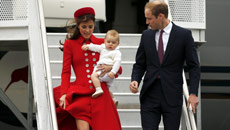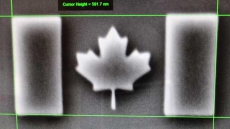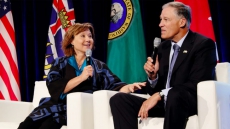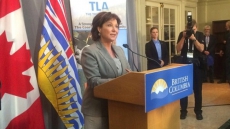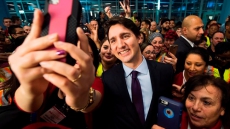A new poll suggests Canadians would like to see efforts to honour fallen soldiers extend well beyond Remembrance Day.
The study commissioned by Historica Canada found a vast majority of respondents would like to see a national monument to soldiers who died in combat in modern times.
About 76 per cent of them said they'd like to see a memorial similar to the United States' Vietnam Wall, which lists the names of those who have died while serving in their country's military.
The poll also found 86 per cent of those surveyed felt creating some sort of national monument should be part of Canada's upcoming 150th birthday celebrations.
Survey respondents also emphasized the need for ongoing education on Canada's military accomplishments, with 62 per cent saying Canada's students are not learning enough about the country's war-time efforts.
The finding comes despite a growing number of Canadian provinces emphasizing Canadian history as part of the middle or high school curriculum.
Historica Canada Chief Executive Anthony Wilson-Smith said the poll results, prepared by Ipsos, carry on a trend that's emerged in recent years.

"We continue to see very strong support that transcends political divisions or even philosophical difference for the principle of honouring veterans," he said in a telephone interview.
The desire for a single, comprehensive monument has been a consistent theme in all of the company's research and on-the-ground outreach efforts, he said.
While people appreciate the hundreds of individual cenotaphs and memorials that exist, Wilson-Smith said there is a clear appetite for a single point at which to congregate and pay tribute to soldiers who fell in conflicts spanning the First World War to the more recent mission in Afghanistan.
A desire for more comprehensive education has also remained consistent, he said, despite recent efforts to beef up performance in that area.
Earlier this year Historica Canada released a report card ranking Canada's provinces and territories on the quality of their history instruction in their middle and high school curricula.
Four provinces and one territory earned A grades, up sharply from 2009 when four provinces were assigned an "F" and none received an "A."

The survey results highlight a long-held belief that people learn best from those who were directly involved in war, with 89 per cent of respondents saying words from veterans are the most powerful way to teach youth about the historical events they took part in.
Wilson-Smith said the number of veterans who took part in major conflicts like the Second World War are dwindling, making it more urgent to document their experiences and share them widely.
Canada also lacks the sort of physical reminders that can keep war-time memories alive across generations, he said, adding this fact highlights the need for more active instruction.
"We have never had conflict in our lifetimes on these shores. When you go to Europe...you go to a town and you see the pock-marked buildings from bullet holes from street fighting, you see the places where the bombs landed," he said. "Here there's a much more distant sense. Here we're much more reliant on actually being taught...than would be the case elsewhere where it's literally part of your upbringing."
The poll also found that 26 per cent of participants plan to attend a Remembrance Day ceremony, down six points from 2015.
More people plan to either wear a poppy or observe two minutes of silence on November 11th, the survey found, citing 77 per cent and 73 per cent of participants respectively.

The Ipsos online poll surveyed 1,004 participants between Oct. 20 and Oct. 24, then weighted the results to best reflect Canada's adult population.
The polling industry's professional body, the Marketing Research and Intelligence Association, says online surveys cannot be assigned a margin of error because they do not randomly sample the population.

